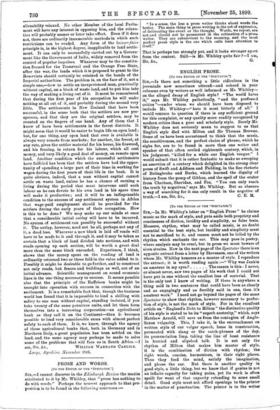ENGLISH PROSE.
[TO THE EDITOR OF THE "SPECFATOR.1
Si,—Is there not something a little ridiculous in the jeremiads now sometimes uttered—and echoed in your columns even by writers as well informed as Mr. Whibley- on the alleged decay of English style? "The world bates it," says Mr. Whibley pathetically, "and the professed critics "—under whom we should have been disposed to include Mr. Whibley—" bate it most bitterly of all." I would venture to question if there is any sufficient ground for this complaint, or any quality more readily recognised by modern critics than a pure and scholarly style. Surely Mr. Whibley does not seriously mean to suggest to us that English style died with Milton and Sir Thomas Browne. Some of us have been accustomed to think that the music, the sensitiveness, and the perfect choice of phrase, which he sighs for, are to be found in more than one writer and speaker of that often reviled eighteenth century, which, in his judgment, "killed for a while our English tongue." I would submit that it is rather fantastic to make so sweeping an assertion of a century which delighted in the strong clear prose of Swift and Addison and Fielding, in the fine rhetoric of Bolingbroke and Burke, which learned the dignity of history from the pomp of Gibbon, and the spell of the orator from Chatham, Sheridan, and Fox. "You can only reach the truth by negatives," says Mr. Whibley. But so obscure a way of searching for it can only result in the negative of










































 Previous page
Previous page